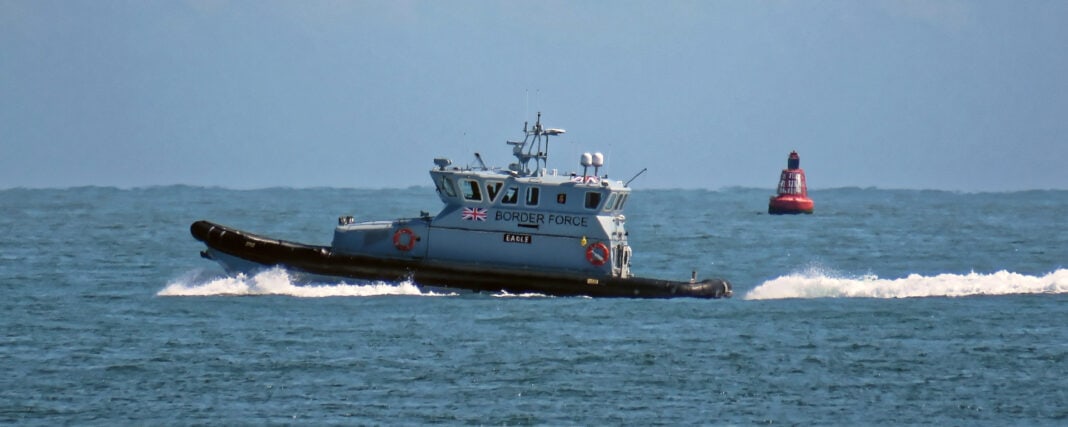In March 2023, Rishi Sunak announced plans to stop migrant crossings via small boats (source). Furthermore, the Illegal Migration Bill will stop anyone who travels on ‘small boats’ from seeking asylum in the UK. Organised criminal gangs mostly facilitate a major industry of cross-channel people smuggling. These ‘small boat gangs’ make a profit from desperate migrants seeking to enter the UK and in some cases, use weak equipment endangering the lives of those crossing the English Channel.
1.0. Cross-Channel People Smuggling: The Industry
The movement of migrants across the channel has increased since 2020 when the COVID-19 pandemic hit (source). In addition, the number of people entering the UK illegally in 2022 reached 45,000 which is a record high (source). In 2022, there was an average of 41 people per small boat aiming to cross the channel (source). Around 16% of those travelling were children under 16 years old (source). The nationality of those travelling on small boats into the UK between 2018 and 2020 include (source):
- 51% Iran
- 26% Iraq
- 6% Syria
- 4% Afghanistan
The UK National Crime Agency categories these types of gangs as Organised Immigration Crime (OIC). They consequently define this as moving a “person across borders without legal permission or documentation” (source). Those involved in Organised Immigration Crime can earn a large amount of cash by facilitating the prices. Moreover, prices charged by people-smugglers estimates between €500 and €6000 per person (source)(source). Reports suggest that around three quarters of smugglers then invest their money in Britain buying property or investing in small businesses (source).
Criminal organisations are estimated to have generated a profit of €30 million through people-smuggling operations in 2022 (source).
2.0. Who is Involved in the Small Boat Gangs?
Several organised crime groups operate the smuggling route from France ot the UK. Currently, for example, the UK National Crime Agency has 50 ongoing investigations into people-smuggling criminal gangs (source). In 2022, British authorities were successful in dismantling a major criminal network (source). The group are suspected of smuggling around 10,000 people into the UK using small boats. This particular organised crime group had members facilitating the process in the UK, Germany, the Netherlands, and France.
These gangs do not facilitate all crossings.
Important to note is that not all crossings are operated by these criminal gangs. Reports indicate that on many occasions groups and families buy dinghies and small boats from France themselves (source). The UK’s National Crime Agency has reiterated that organised criminal groups are not involved in some occasions.
3.0. Promotion
Most commonly, members of the people-smuggling gang will visit migrant camps and find customers there (source). Criminal gangs have also used the internet and the dark web to communicate and advertise their services (source).
However, small boat gangs have started using some modern methods in order to obtain business. Reports from the BBC found that traffickers have profiles on TikTok. They use small videos on the network to advertise crossing dates and compete with rival people-smuggling gangs on who is the “best” operator for crossings (source).
4.0. The Process of Small Boat Crossings
Members of the people-smuggling network may approach migrants in France or other European countries such as Germany. They will then transport the group to Northern France. The criminal gangs will then obtain a boat to transport the passengers on. Many French coastal towns no longer sell small boats and dinghies in an effort to curb people smuggling (source). Gangs now buy the boats in Germany, the Netherlands or even Turkey and transport them to France (source).
Types of boats commonly used (source):
- Rigid-Hull Inflatable Boats (RHIBs)
- Small-Soft Inflatable Boats (SIBs)
- Zodiac Type Inflatables

Payment
Migrants often pay the gangs through a hawadalar (source). The agent informally arranges for an agreed price and makes the funds available in another country (source). This method ensures that a formal banking system does not flag criminal groups.
5.0. What are states doing to tackle small boat gangs?
Europol set up a dedicated task force to investigate criminal networks using small boats to smuggle migrants across the channel (source). The Operational Task Force involved Belgium, France, Germany, Netherlands, and the UK.
Additionally, the UK is funding a new migrant detention centre in Northern France (source). Furthermore, the Home Secretary has issued a new bill that will give the government the ability to deport people who arrive via irregular channels. This bill is primarily aimed at stopping people travelling to the UK via small boats crossing the channel. The European Court of Human Rights have objected to the bill which will bar migrants who come on small boats from seeking asylum in the UK.
The UK has also set up a “Small Boats Operational Command” and hired 730 additional staff to target those arriving in the UK on small boats (source). The operation will combine military personnel with the National Crime Agency and French partners to create a coordinated response.
6.0. The Victims of Small Boat Gangs
It is important to highlight the cost of people-smuggling gangs. In 2021, around 33 people lost their lives attempting to cross the channel on small boats (source). This is partially due to the lack of concern from the gangs organising the journeys. Many criminals often care more about the profit and will use cheap boats which are unable to deal with the crossing when conditions are bad. In an interview with Al Jazeera, a people smuggler named Abu Sharif stated:
“When I send you out to sea you’ll either make it or you won’t. Either way I’ll make my money” (source).
The new Illegal Migration Bill by the UK government ultimately targets the victims of people-smuggling rather than the criminal gangs themselves. Instilling more fear in the migrant community will result in them taking more extreme measures to gain asylum in Britain. There is currently no way to apply for asylum from outside of the UK, thus limiting the safe routes to the UK (source).

